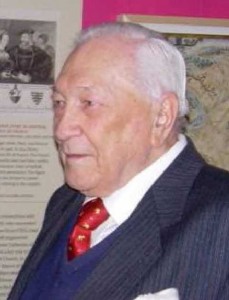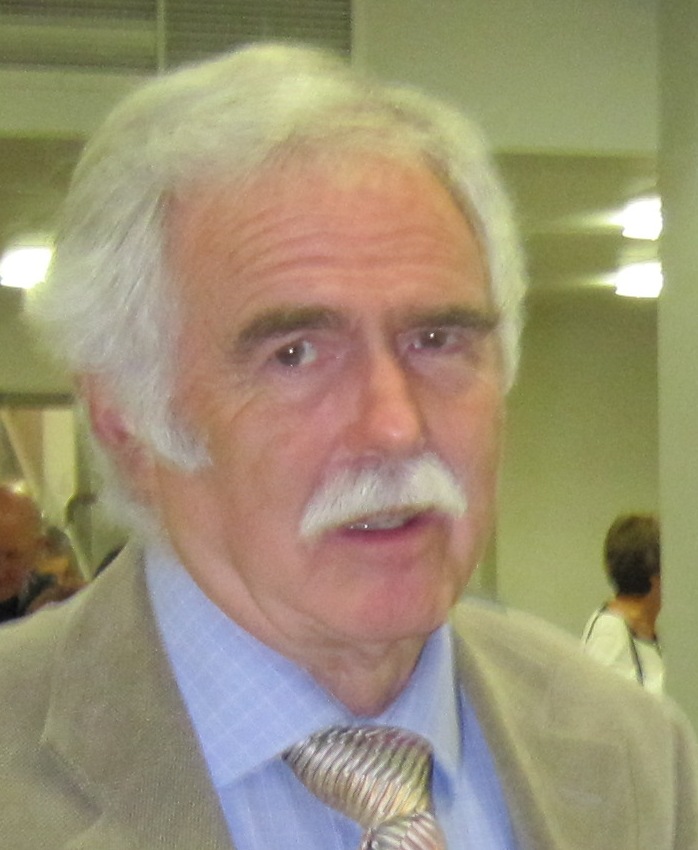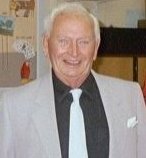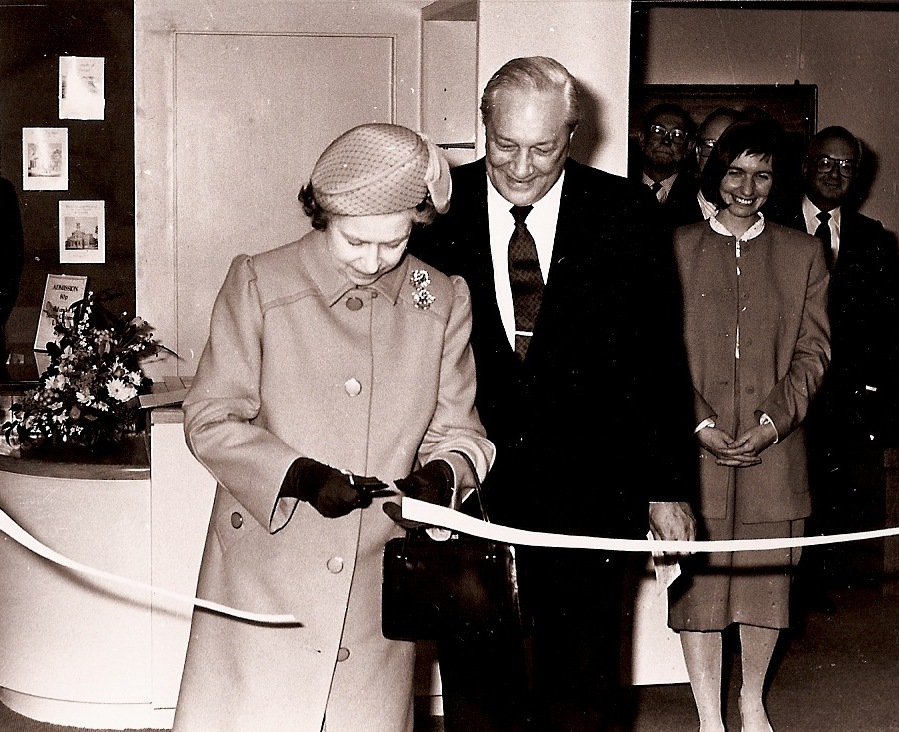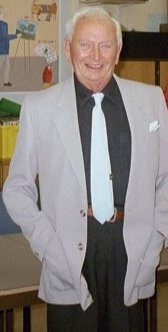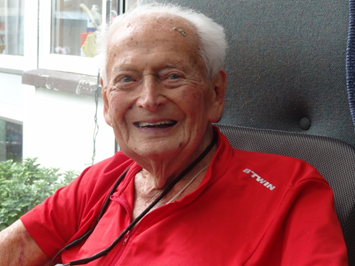The Society can trace its origins to a talk on the history of Richmond given by John Cloake to The Richmond Society on 25 February 1975. It resulted in the setting up of the History and Archaeology Section of The Richmond Society, launched in April 1975 under John Cloake’s chairmanship. The archaeologists subsequently broke away to form the Richmond Archaeological Society. In 1985 the Richmond Society’s History Section also became an organisation in its own right as the Richmond Local History Society.
John Cloake, our first Chairman, and later our first President, was a guiding force in the Society’s development. In December 2003 he gave a talk to the Society on Forty Years of Richmond History, charting the development of his own enthusiasm for history and, since his arrival in Richmond 40 years previously, his interest in the local history of Richmond. His talk also encompassed the history of the Richmond Local History Society.
We lost John Cloake in 2014 and also, later that year, Christopher May, our then-Chairman and editor of our annual journal, Richmond History. A full appreciation of the contribution of Chris May to the work of the Society appeared in Richmond History 36, published in May 2015.
Norman Radley, our Chairman from 1995 to 2003, and later one our Vice-Presidents, died in September 2015, a few days after celebrating his 94th birthday. An appreciation of Norman Radley appeared in Richmond History 37, published in May 2016.
David Blomfield, the Society’s President from 2014 to 2016, died on 12 July 2016, the day after his 82nd birthday. He was our Chairman from 2003 to 2013 and edited Richmond History from 1994 to 2001.
David was a distinguished local historian, whose books Kew Past, The Story of Kew and (with the late Christopher May) Kew at War 1939-1945, broke new ground in recording what had happened in Kew in its recent past as well as in previous centuries. By telling it in a compelling manner, he made the fascinating story of Kew accessible to everyone and encouraged its residents and visitors alike to take an active interest in their own local history. David’s area of interest and expertise was not confined to Kew. Only three months ago, he gave a very well researched and received talk at our meeting on 11 April on the history of Richmond’s Star and Garter Home. You can listen to his talk on our Soundcloud page. None of us knew then that he was ill and he himself was not sure of the extent of his illness. And we did not know that this would be his last public appearance at the Society, apart from a brief visit to our stall at the Richmond May Fair. David was editor of our journal, Richmond History, from 1994 until 2001 and chaired the Society for ten years from 2003 to 2013. After stepping down as Chairman, David – who was elected President at the 2015 Annual General Meeting – continued to be a very active member of the Society’s committee and, with Len Chave, spearheaded our publications programme. When Chris May, his successor as Chairman and Editor of Richmond History, passed away suddenly in November 2014, David rolled up his sleeves and resumed, temporarily, the role of journal editor. David continued to take a keen interest in our publications work, even in the latter stages of his illness when, at great effort, he made the time to hand over the Society’s affairs with considerable thought and thoroughness. My colleagues and I on the Society’s committee are very shocked by this turn of events, coming so soon after the Society has also lost John Cloake, Chris May and Norman Radley. We will miss David’s wise counsel and his encouragement to all of us in our roles. But we recognise how indebted we all are to David for the outstanding contribution he has made to the Society’s success and for the exemplary leadership he has demonstrated, as chairman, as president and as publisher. We now feel empowered to carry on with the Society’s work on a path that he has set and to develop his vision still further. Our immediate thoughts are with David’s wife Caroline, and with his children James, Melanie and Rupert and their families to whom we convey the Society’s sincere condolences. Robert Smith ** UPDATE, 16 July: Following a private family funeral in the morning, there will be a celebration of David’s life (for which formal black attire is not expected) on Tuesday 26 July at 3pm at the Barn Church, Atwood Avenue, Kew TW9 4HF, and afterwards at Priory Park Tennis Club, TW9 3BZ. Priory Park is at the end of Forest Road, Kew. *** DAVID BLOMFIELD – a profile by Harriet Grace (written in 2009 and published in issue 25 (November 2009) of The Link, the magazine of the Kew parishes of St Luke’s and the Barn. Reproduced with permission) The youngest of three brothers and the son of an army officer, David was the only one go to Oxford. After Oxford he joined the Readers Digest as Editor for the Condensed Books series and had a successful career at the Digest for nearly thirty years. It was there he met Caroline. They married, moved to Kew in 1965 and soon became involved in the community, church and local government. David says that it was the education of their three children at Queen’s that made him realise the importance of representation and involvement at a local level. Kew had a community and he wanted to invest in it. He fought to change the rules at Queen’s School to permit parental governors, and subsequently became a governor of Queen’s, Darrell Infant and Junior, Gainsborough Secondary School and Windham Nursery school. In the late 1960s he and Caroline helped Pat Lewis set up the Barn Nursery School in the new church hall, and for four years Caroline ran a satellite nursery in Gloucester Road. Education led to local politics. He’d always been a Liberal supporter, but what interested him was a smaller population – the “politics of the parish pump” – where it was possible to identify with the people and the problems, and do something about it. He was a councillor from 1971 to 1978, and from 1979 to 1986, and during this period the council had more powers than at present, which made it important and rewarding work. At the end of the 1980s David left the Reader’s Digest and became a freelance editor, and Caroline opened Kew Bookshop. David was church warden at the Barn during Tim Beaumont’s time and when Nick Darby took over, David chaired the committee responsible for converting the west end of the Barn Church, an operation which required a sensitive architect and a willing congregation. The work was completed in 2002 and has meant that the church is now used by the community every day of the week. He has also been responsible for chairing the building of the Orange Tree Theatre and the conversion of St Luke’s House, plus numerous other community projects, which led, in 2000, to the award of an MBE. Throughout all these activities runs David’s passion for local history. When Kew Bookshop opened in 1989 it needed a book about Kew’s local history so Caroline challenged David and since then he has written three books: Story of Kew, Kew Past, and very recently Kew At War. He completed a PhD in 2007, his thesis being on the Boatmen on the Kew stretch of the Thames. A church-goer all his life David talks about a “pilgrimage of faith” where he is always exploring. A truly modest, clever and deep-thinking http://premier-pharmacy.com/product-category/weight-loss/ man, he has been supported throughout by Caroline. They have lived, worked and contributed to life in Kew for over forty years. Without exaggeration they have changed its landscape for the better.
David Blomfield 1934-2016
We are very sorry to tell you that our President, Dr David Blomfield, has died after a short but very severe illness. David, the Society’s chairman for ten years and a former editor of our journal, Richmond History, spent his 82nd birthday at home, surrounded by his extended family. He died the next day, Tuesday 12 July.
Chairman, Richmond Local History Society
13 July 2016
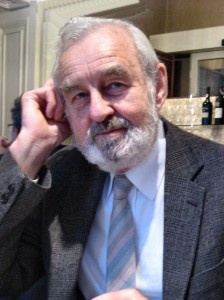 I first met David Blomfield when I was eleven and he was a charming, very good-looking undergraduate at Oxford. He was a friend of my sister and my parents were giving a dance. I was too young to attend but at lunch on the day I was placed next to him, and what I remember is that he talked to me and listened. When he could have ignored me, he made me feel special. If I had known, and understood what it meant, that he’d got an exhibition to read Classics (Mods and Greats) at Hertford College, and that before that he’d done his National Service for two years in the early fifties, most of it in Germany in a barracks next to Belsen, I would have been too shy to open my mouth. Now over fifty years later he’s still as good-looking and I can see that his quiet, caring generosity has underpinned all that he has done.
I first met David Blomfield when I was eleven and he was a charming, very good-looking undergraduate at Oxford. He was a friend of my sister and my parents were giving a dance. I was too young to attend but at lunch on the day I was placed next to him, and what I remember is that he talked to me and listened. When he could have ignored me, he made me feel special. If I had known, and understood what it meant, that he’d got an exhibition to read Classics (Mods and Greats) at Hertford College, and that before that he’d done his National Service for two years in the early fifties, most of it in Germany in a barracks next to Belsen, I would have been too shy to open my mouth. Now over fifty years later he’s still as good-looking and I can see that his quiet, caring generosity has underpinned all that he has done.
John Cloake, who died on 9 July 2014, was President, and the first chairman, of the Richmond Local History Society. He was also the founder of the Museum of Richmond and first Chair of its Board of Trustees. John Cloake, whose career was in the diplomatic service, came to Richmond in 1962. He became an active member of the Richmond Society and established its local history section, which in 1985 became the Richmond Local History Society. As well as contributing regularly to the Society’s annual journal Richmond History (including, posthumously, the May 2015 issue), he wrote several books on local history topics, including Richmond Past: A Visual History of Richmond, Kew, Petersham and Ham and The Palaces and Parks of Richmond and Kew. John Cloake was elected a Fellow of the Society of Antiquaries of London in 1988, and awarded an Honorary DLitt. from Kingston University in 2004. You can also read here:
John Cloake 1924-2014
Norman Radley, a former Chairman of the Society and one of our Vice-Presidents, died on Wednesday 16 September 2015, a few days after celebrating his 94th birthday. His funeral, a humanist cremation ceremony and a celebration of his life, was held on 9 October and his family would like to thank all of the Society’s members who came to it Norman succeeded Iris Bolton as the Society’s Chairman and was elected at our AGM in May 1995. He served eight years as our Chairman, retiring at the AGM in May 2003, when he was succeeded by David Blomfield. During his Chairmanship two major events were celebrated – the 500th anniversary of the naming of Richmond Palace (when the Society organised a sell-out talk given by Simon Thurley) and, in 2003, the commemoration of the 400th anniversary of the death of Queen Elizabeth I. On taking over as Chairman, he wrote in our September 1995 newsletter: “My association with Richmond began fifty six years ago when I was a student at Borough Road College, Isleworth. My ambition to live and work in this vicinity was realised in 1954 when I was appointed to teach history at the now defunct Gainsborough Road School so thirty-two of my forty-five years in the teaching profession have been spent in Richmond. Having fallen under Richmond’s historical and geographical spell all those years ago, one of my main aims in the teaching of history was to promote social and local aspects and to open doors for my students to discover for themselves the fascination of our local heritage.” Norman completed his teaching practice at Gainsborough School, Richmond and returned in 1953 to teach history and drama there. When the school closed in the 1970s and its site was developed into housing, Norman moved to Shene School (now Richmond Park Academy). He took to Shene School a memorial plaque commemorating those from Gainsborough School (known before the war as Richmond Central School) who had given their lives in the Second World War. In 1991 Norman wrote Borough Secondary Schools: Richmond Upon Thames Ex-Surrey side: a short history. On his retirement from teaching Norman became a Richmond Voluntary Guide and then their Chairman. He researched and wrote for The Richmond Society of Voluntary Guides the popular Ghosts, Murder and Mayhem in Richmond, which was published in 2001. He gave various talks, including “Royalty in Richmond” and “Royal Mistresses”. Norman had “a true passion for borough history” as this Richmond and Twickenham Times article, published on 3 December 2004, explains. Norman made a significant contribution to the Society’s work and will be very much missed. After retiring as Chairman he continued to support the Society by regularly attending meetings and Committee meetings and was elected Vice-President of the Society in May 2004.
Norman Radley 1921-2015
John Cloake: Forty Years of Richmond History
Our late President, John Cloake, who died in July 2014, addressed a packed audience at the Richmond Local History Society on 8 December 2003, marking his 40 years of research into the history of Richmond. Read the text of his talk, Forty Years of Richmond History.
